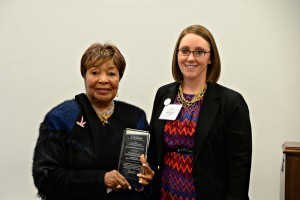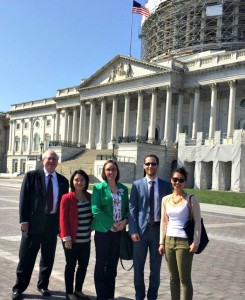Issue 06 (March 22)
COSSA Washington Update, Volume 35 Issue 6
Featured News
COSSA in Action
- Social Science Advocates Take Capitol Hill
- COSSA Presents Rep. Eddie Bernice Johnson with Distinguished Service Award
Congressional News
- House Subcommittee Discusses FY 2017 NSF Budget, Funding for All Disciplines of Science
- NIH Makes Annual Appearance Before House Labor-HHS Appropriations Subcommittee
Federal Agency & Administration News
- DARPA Announces Next Generation Social Science Program; Abstracts Due March 31
- HHS Seeks Members for Healthy People 2030 Advisory Body
Publications & Community Events
Funding Opportunity Announcements
COSSA Member Spotlight
Recap of the 2016 COSSA Annual Meeting
COSSA held its 2016 Annual Meeting on March 15th in Washington, DC. Meeting sessions focused on topics like congressional attacks on federally-funded research, social science and the media, use of social and behavioral science in industry, and how to communicate the value of social and behavioral science research. In addition, participants heard updates on activities at federal agencies, including the National Science Foundation, National Institutes of Health, National Institute of Justice, Environmental Protection Agency, and Bureau of Labor Statistics. Click here to read COSSA’s summary of the meeting’s sessions. You can also check out our social media recap, which covers both the Annual Meeting and Social and Behavioral Science Advocacy Day.
COSSA Presents Rep. Eddie Bernice Johnson with Distinguished Service Award
 On March 15, as part of COSSA’s Annual Meeting and Celebration of Social and Behavioral Science reception, COSSA presented the 2016 Distinguished Service Award to Congresswoman Eddie Bernice Johnson (D-TX). Congresswoman Johnson was recognized for her “unwavering support for social and behavioral science research and steadfast leadership on behalf of the U.S. scientific enterprise.” In accepting the award, Congresswoman Johnson reaffirmed her commitment to all disciplines of science and resolved to continue to ensure that social science receives the support it deserves.
On March 15, as part of COSSA’s Annual Meeting and Celebration of Social and Behavioral Science reception, COSSA presented the 2016 Distinguished Service Award to Congresswoman Eddie Bernice Johnson (D-TX). Congresswoman Johnson was recognized for her “unwavering support for social and behavioral science research and steadfast leadership on behalf of the U.S. scientific enterprise.” In accepting the award, Congresswoman Johnson reaffirmed her commitment to all disciplines of science and resolved to continue to ensure that social science receives the support it deserves.
Social Science Advocates Take Capitol Hill
 On March 16, about 50 social and behavioral science researchers, stakeholders, and advocates met with their Members of Congress to advocate in support of fiscal year (FY) 2017 funding for federal agencies and programs that support social and behavioral science research. Despite the system-wide shutdown of the DC Metro, advocates from 14 different states made it to Capitol Hill to discuss the value of this research and why it is in the national interest. Materials used to help articulate these messages can be found on the COSSA website, including fact sheets on COSSA’s FY 2017 funding requests.
On March 16, about 50 social and behavioral science researchers, stakeholders, and advocates met with their Members of Congress to advocate in support of fiscal year (FY) 2017 funding for federal agencies and programs that support social and behavioral science research. Despite the system-wide shutdown of the DC Metro, advocates from 14 different states made it to Capitol Hill to discuss the value of this research and why it is in the national interest. Materials used to help articulate these messages can be found on the COSSA website, including fact sheets on COSSA’s FY 2017 funding requests.
Friends of IES Briefing Highlights Research on Supporting Students with Disabilities Transition to Adulthood
On March 4, the Friends of the Institute of Education Science (IES), in cooperation with honorary co-chairs Senator Lamar Alexander (R-TN), Rep. Suzanne Bonamici (D-OR), and Rep. Michael Honda (D-CA) held a congressional briefing, “Transitioning to Adult Productivity: Supporting Secondary Students with Disabilities in Successful Movement to College and Career.” IES’ National Center for Special Education supports research that has identified interventions that can “prepare students with disabilities for postsecondary education and the workforce.” The COSSA-supported briefing featured IES-funded research on improving transition outcomes for students with disabilities. Speakers discussed how the programs assist these students in gaining employment, becoming academically successful, and thriving socially after leaving high school. Speakers included Erik Carter, Vanderbilt University; Laurie Powers, Portland State University; David Test, University of North Carolina, Charlotte; and Mary Wagner, SRI International. Deborah Ziegler, Council for Exceptional Children, moderated the session. The speakers’ presentations and photos from the session are available here.
DARPA Announces Next Generation Social Science Program; Abstracts Due March 31
The Defense Advanced Research Projects Agency (DARPA) of the U.S. Department of Defense has announced a new social science research effort – Next Generation Social Science (NGS2) – which seeks to “begin to assess the research opportunities provided by today’s web-connected world and advanced technologies.” NGS2 is looking to fund research that will enhance three core social science capabilities – predictive modeling and hypothesis generation, innovative experimental methods and platforms, and interpretation and reproducibility of research results. An initial focus of the program will be to “challenge researchers to develop and use new tools and methods to identify causal mechanisms of ‘collective identity’ formation—how a group of individuals becomes a unified whole, and how under certain circumstances that community breaks down into a chaotic mix of disconnected individuals.”
Abstracts are due March 31, with full proposals due May 18.
HHS Seeks Members for Healthy People 2030 Advisory Body
On March 17, the Department of Health and Human Services (HHS) announced that it is establishing the “Secretary’s Advisory Committee on National Health Promotion and Disease Prevention Objectives for 2030 (Committee)” and is inviting nominations for membership. In 1979, HHS created Healthy People, an initiative “grounded in the notion that setting science-based, measurable objectives and monitoring progress can motivate action.” The new Committee is expected to provide relevant and objective advice around health determinants and risk factors. It will perform the “single, time-limited task” of providing advice regarding creating Healthy People 2030 and advise the HHS Secretary on the Healthy People 2030 mission statement, vision statement, framework, and organizational structure. The Department is particularly seeking those with specialties in “biostatistics, business, epidemiology, health communications, health economics, health information technology, health policy, health sciences, health systems, international health, outcomes research, public health law, social determinants of health, special populations, and state and local public health and from a variety of public, private, philanthropic, and academic settings.” Nominations for membership to the Committee are due April 18, 2016. Additional information is available on the Department’s Healthy People website.
House Subcommittee Discusses FY 2017 NSF Budget, Funding for All Disciplines of Science
On March 16, the House Commerce, Justice, Science Appropriations Subcommittee held a hearing on the fiscal year (FY) 2017 budget request for the National Science Foundation (NSF), featuring NSF Director France Córdova. Subcommittee Chairman John Culberson (R-TX) opened the hearing by expressing the subcommittee’s longtime support for NSF and basic research, while noting the need to be “exceptionally good stewards” of taxpayer dollars given the tough budgetary environment. As previously reported, the President’s budget request for NSF includes $400 million in one-time mandatory funding, which Chairman Culberson said is “not going to happen.” (more…)
NIH Makes Annual Appearance Before House Labor-HHS Appropriations Subcommittee
On March 16, National Institutes of Health (NIH) Director Francis Collins made his annual, and perhaps final, appearance before the House Appropriations Subcommittee on Labor, Health and Human Services, and Education (Labor-HHS) as an official of the Obama Administration. Collins was accompanied by four of the NIH’s 27 institute and center directors and/or acting directors, including Anthony Fauci, National Institute of Allergy and Infectious Diseases (NIAID); Richard Hodes, National Institute on Aging (NIA), Doug Lowy, National Cancer Institute (NCI); and Nora Volkow, National Institute on Drug Abuse (NIDA).
The NIH panel received a warm welcome from Appropriations Committee Chairman Harold Rogers (R-KY) and Ranking Member Nita Lowy (D-NY). Opening the hearing, Subcommittee Chairman Tom Cole (R-OK) was the first of the Subcommittee members to express pride in securing a $2 billion increase for NIH in FY 2016. Cole, however, expressed disappointment with the Administration’s FY 2017 budget request, which directs “$1 billion of biomedical research funds to the mandatory side of the budget.” Stating he does not plan to “let the $1 billion cut stand,” he emphasized the need to focus “on the next generation of investigators.” (more…)
Funding Opportunity Announcements
- AHRQ: AHRQ Announces Interest in Research on Health IT Safety (NOT-HS-16-009)
- DARPA: Next Generation Social Science (NGS2) (DARPA-BAA-16-32)
- NIJ: Investigator-Initiated Research and Evaluation on Firearms Violence (NIJ-2016-9091)
- NIH: NIH Director’s Early Independence Awards (DP5) (RFA-RM-16-006)
- NIMH: Using the NIMH Research Domain Criteria (RDoC) Approach to Understand Psychosis (R21) (PAR-16-135), (R01) (PAR-16-136)
- NCI: Cancer Research Education Grants Program to Promote Diversity – Research Experiences (R25) (PAR-16-138), (R25) (PAR-16-139)
- NIGMS: Maximizing Investigator’s Research Award (R35) (RFA-GM-17-002)
- NIH/AHRQ: Notice of Intent to Publish a Funding Opportunity Announcement for Dissemination and Implementation Research in Health (R01) (NOT-CA-16-025), (R21) (NOT-CA-16-026) [NCI, AHRQ, NCCIH, NHGRI, NHLBI, NIAAA, NIDA, NIDCD, NIEHS, NIMH, NIMHD, NINDS, ODP]
LSA Releases Annual Report on State of Linguistics in Higher Ed
The Linguistic Society of America (LSA), a COSSA Governing Member, has issued its third Annual Report on the State of Linguistics in Higher Education. The report shows a growing popularity of the linguistics major at four-year colleges and universities, as well as a number of other interesting highlights, including career trends, demographics, and specializations.
Events Calendar
- What does it mean to be a citizen in contemporary America? Washington, DC, March 22, 2016
- Southwestern Social Science Association Annual Meeting, Las Vegas, NV, March 22-27, 2016
- Midwest Sociological Society Annual Meeting, Chicago, IL, March 23-26, 2016
- Association of American Geographers Annual Meeting, San Francisco, CA, March 28-April 2, 2016
- NIJ Webinar: New Investigator/Early Career Program in the Social and Behavioral Sciences, March 29, 2016
- Academy of Criminal Justice Sciences Annual Meeting, Denver, CO, March 29-April 2, 2016
- Society of Behavioral Medicine Annual Meeting, Washington, DC, March 20-April 2, 2016
- Population Association of America Annual Meeting, Washington, DC, March 31-April 2, 2016
- Association for Asian Studies Annual Conference, Seattle, WA, March 31-April 3, 2016
- Society for Research on Adolescence Biennial Meeting, Baltimore, MD, March 31-April 2, 2016
- NIH and the Science of Science and Innovation Policy: A Joint NIH-NSF Workshop, Bethesda, MD, April 7-April 8, 2016
- Midwest Political Science Association Annual Conference, Chicago, IL, April 7-April 10, 2016
- American Educational Research Association Annual Meeting, Washington, DC, April 8-April 12, 2016
- Progress Reversed: The Importance of Health, Mortality and Poverty for Public Policy, Washington, DC, April 11, 2016
- “Wasteful” Research? Looking Beyond the Abstract, Washington, DC, April 13, 2016
- Southern Sociological Society Annual Meeting, Atlanta, GA, April 13-17, 2016
- 22nd Annual CNSF Exhibition & Reception, Washington, DC, April 26, 2016
- American Association for Public Opinion Research Annual Conference, Austin, TX, May 12-15, 2016
A list of COSSA members’ annual meetings and other events can be found on the COSSA website. COSSA members who have an upcoming event they would like to see listed in the Events Calendar and on our website should send an email to jmilton@cossa.org.

